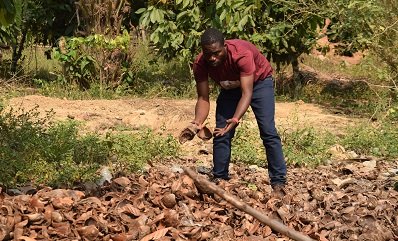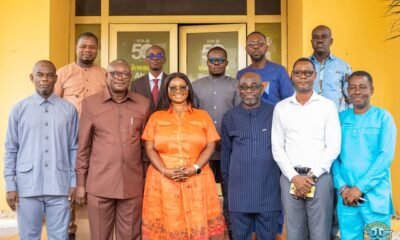Hot!
Ernest Twum Barima makes coconut husk, plastic waste valuable

Realising the extent of waste pollution in his vicinity and the country at large, he thought of alternative ways to make good use the situation. He ended up creating a job for himself and a few others.
Here is Mr Ernest Twum Barima, the young university graduate, whose company produces smokeless and long-lasting charcoal briquettes from coconut husk.


The product, targeted at households and institutions, continues to earn positive review and commendation as the manufacturer intends to scale up production to meet local and international demand.
Business
Ernest is a graduate of Koforidua Technical University (KTU) and Valley View University. He studied Purchasing and Supply at KTU before proceeding to Valley View where he obtained Bachelor of Education (B.Ed.) and Information Technology in Education Management.
He conceived the business idea while studying at Valley View University and decided to roll it out after many attempts to secure a job.
Throughout his educational journey, he had dreamt of establishing his own company and it is, therefore, not surprising that he has surmounted the hurdle.
Currently based at Kyebi-Afiesa in the Eastern Region, the venture known as Adepafie Market Company Limited, began when he procured and distributed 100 pieces of waste bins to encourage responsible waste disposal.
As time went by, he noticed the volume of waste generated daily by coconut vendors in his area and decided to conduct studies into unconventional uses of the discarded coconut husk.
“After I discovered other uses of the coconut husk, I gave empty sacks to the coconut sellers and asked them to offload the husks at my house at the end of every business day.
“My family initially could not come to terms with why I was turning our house into a dumpsite for coconut husk and even thought I had lost my mind,” he told The Spectator.
Unperturbed by these unsavoury comments, however, Ernest kept fine-tuning his idea until 2019, when he produced the first batch of charcoal briquettes to be used at home.
Community members, impressed with the outcome, subsequently encouraged him to start producing for commercial use.
Challenges
According to the initiator, steps towards commercialisation was challenging as he sought financial and technical assistance from some private entities but they failed to deliver on their promise after series of engagement with them.
Undauntedly, he relied on personal savings and the support of family and friends to get his idea off the ground. And with barely a year into his business, he has employed six people who are supporting him presently.
Apart from making charcoal briquettes, Ernest again recycles plastic waste into pavement bricks which, he said, could be a substitute for concrete blocks used in road construction.
Production process
Explaining the making of the charcoal briquettes, he said “the coconut husk is allowed to dry and later burnt and crushed into powder. The powder is then compacted with an organic binder, extruded and moulded into desired shapes and finally left to harden.”
He said he used to go through these processes manually but had now been able to build a makeshift machine which enables him to produce faster.
“I could produce only two bags of charcoal briquette in three days when there was no machine, but I am now able to produce about 10 bags in a day. The quality has improved and it is currently in high demand,” he said.
The charcoal briquette is packed in paper bags, made from plantain stem, and sold at GH 3.00 per Kilo.
The Chief Executive Officer says he has intended to reduce the price in future and has encouraged traditional charcoal producers to adopt his approach and stop cutting trees for charcoal production.
Future
In spite of the progress made, Ernest continues to fall on the support of family and friends to fund his operations.
“I could not meet the requests of my clients previously but I can now meet their need within a month with the little machine I use at the moment.
“I receive a lot of orders from across the country and if I get the needed support to expand production I know things would get better,” he noted.
The mini factory for the charcoal briquette, he said, was situated on a piece of family land, and he would require modern machines and vehicles to convey raw materials to help speed up production.
Although the company makes some profit, Ernest says the income generated goes into repayment of loans he has secured from family and friends.
With the required support, he intends to set up a bigger factory in Accra and Kumasi and employ more youth, should he get the needed support.
By Ernest Nutsugah
Hot!
Swedru All Blacks back to winning ways, Roshan humble King Faisal

Sekondi Rospak FC made it eight wins in eight successive home games after three second-half goals from John Amoah, Joseph Ntow and Stephen Anthony Kofi. John Amoah opened the scoring in the 55th minute after a barren first half. Joseph Ntow added to the tally in the 56th minute before Stephen Anthony Kofi rounded things up in the 74th minute to give Rospak a 3-0 win over former Premier League side King Faisal.
Elsewhere at Swedru – leaders Swedru All Blacks humbled PAC Academy in an emphatic 2-0 win. Zayat Bubakari scored first for Swedru All Blacks in the 27th minute before Rudolf Junior Nana Kwasi Mensah made it 2-0 in the 34th minute. Swedru All Blacks are top of the table with 36 points – 4 points ahead of second placed Rospak FC.
Meanwhile, Former Premier League side Cape Coast Mysterious Dwarfs recorded their fourth successive home victory after beaten New Edubiase United 2-1 at the Robert Mensah Park. Enoch Odoom struck first for Cape Coast Mysterious Dwarfs in the 19th minute but Steven Asante equalized for New Edubiase United before halftime. After the interval, Godfred Eshun scored from distance in the 65th minute to help Cape Coast Mysterious Dwarfs secure all the points.
Here are the results in Zone Two

Hot!
Cervical Cancer alert: Avoid sex at early age

The Programmes Manager of Non-Communicable Diseases (NCDs) of the Ghana Health Service (GHS), Dr Mary Efua Commeh, has advised young girls to avoid sex at an early age.
This, she explained, will give the cervix the opportunity to mature before they become sexually active.
“You need to delay what we call the first sexual intercourse as much as possible to give the cervix the opportunity to mature before the person becomes sexually active,” she said.
Dr Commeh stated this in an interview with The Spectator in Accra on Tuesday as a part of the Cervical Cancer awareness month.
According to her, cervical cancer was the second leading female cancer in Ghana with a total of about 3,072 cases annually, and out of that, 1,815 deaths are recorded, representing more than 50 per cent.
She indicated that “If young girls are going to be sexually active, then you need to talk to your parents about being vaccinated.”
She explained that vaccinating young girls against human papillomavirus (HPV) has been found to be a very effective way of preventing cervical cancer.
“There are countries that started HPV vaccination years ago and they are not seeing any cervical cancers now because they would have eliminated most of the high-risk HPVs in their women. So if the high-risk HPV is not there, then obviously the results on cervical cancers are going to go down,” she added.
Dr Commmey said the HPV vaccination is recommended for young girls aged nine to 14 years, adding that it had been found to be highly effective, not just for cervical cancers but for other HPV-related cancers, such as anal cancers, cancers of the vagina, genital warts, amongst others.
She further elaborated that the idea is to put up a barrier before the HPV comes in and that once a young female encounters it, she is already protected.
She also mentioned that for cervical cancers, the main cause is called HPV infection, saying generally, all sexually active women acquire HPV at some point in their lives.
However, the Programmes Manager of NCDs at the GHS mentioned that the body has a way of clearing the HPV, explaining that it is a natural mechanism that goes on, unfortunately, there are a few women whose HPV persists.
Moreover, she noted that the numbers for Cervical Cancer tend to be much higher because at times, clients would wait, and try all sorts of medications before they finally report to the health facility saying “we actually lose some women before they get to the hospitals with over 75 per cent of the cases coming in its third and fourth stages.”
Dr Commey, therefore, called for public awareness while ensuring the availability of information for prevention and control.
By Jemima Esinam Kuatsinu







